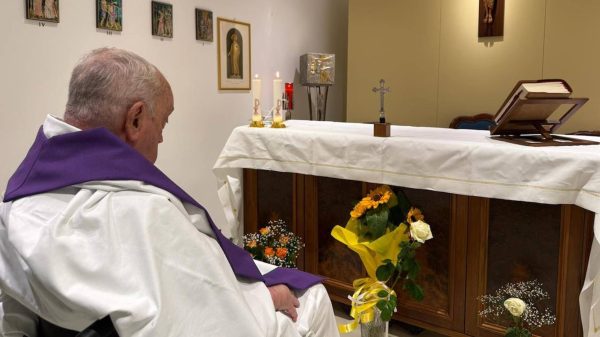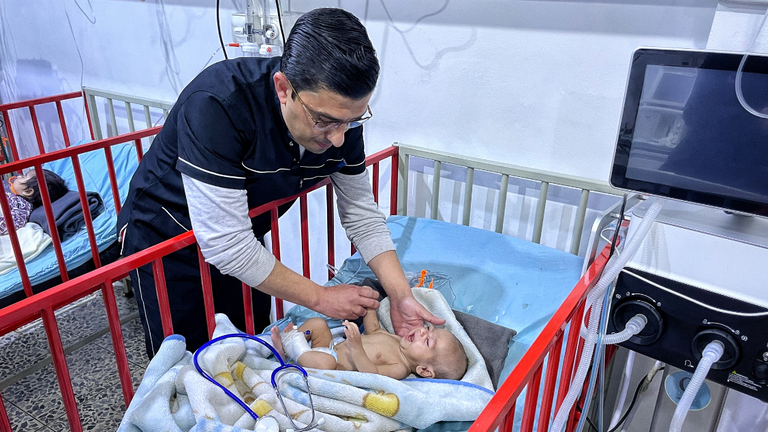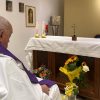Sky News was granted rare access to northwest Syria’s warzone, which is now being hit by terrible earthquakes.
After a series of delays by international community members to assist the last remaining opposition region, children were found dead and others left with severe injuries.
Sky has visited the area twice. Most recently, they spent another 48 hours in the rebel-held area, where an Islamist militant group holds control. This area was most severely affected by the string earthquakes, multiple aftershocks, and tremors that occurred over the past two weeks.
We discovered a number of premature babies born to mothers who were caught in earthquakes. The tiny newborns are struggling to survive with very little help and antiquated equipment.
We saw many children who were the only survivors of their families, but left with severe injuries or with life-altering amputations.
There are entire villages and towns living in poverty, often with their relatives or in tents. They have very few possessions, if any.
Worst of all, they are expressing a collective anger and despair at the international community, particularly the United Nations. They believe that the UN delayed helping them and has sacrificed their children’s lives.
Following the earthquake in Turkey, aid and rescue teams from around the globe poured into the country. However, the Syrians were left to their own devices.
It took over four days for the first UN relief package to reach northwestern Syria.
Many were left behind and it was too late. The small convoys that arrived didn’t have the necessary equipment or rescue specialists to save those who were still under the rubble.
We saw Arsalan, an Arabic name for “lion”, struggling to keep his life alive with each breath he took.
The earthquake that struck the region on 6/02/2017, a magnitude 7.8 in magnitude, left only the three-year old boy of his family to be spared.
Three days later, the White Helmets civil defense group struggled to rescue him and his family.
They pulled out his family one by one – his mother and six-year old sister, as well as his seven-yearold brother.
All of them had been buried under the rubble.
“We don’t have an ICU”
The White Helmets then saw the outline of Suleiman’s body.
He was crouching forward, as if he had used his body to protect his son from the earthquake and rubble that enveloped them.
His lifeless body was slowly removed by volunteers. This was the final brave act of a father trying to save his son’s life and willing to sacrifice his own life in the process.
The White Helmets team was able to see through Suleiman’s body, the child’s arm peeking out of the grey, stony grave. The White Helmets team gently lifted the toddler from the rubble and he opened his eyes. His eyelashes were covered in dust as they passed him along the human chain.
The cry was heard: “He’s alive! He’s alive!” “Alhamdulillah [thank God].”
After nearly two days under their home’s rocks and stones, it was miraculous that anyone survived. It was wintry and without food or water.
A little boy named after a Lion showed extraordinary survival instincts that were beyond his years. The Aquabat Hospital near the Turkish border has been trying to save the boy ever since, but they have no specialised equipment or an intensive care unit. They don’t even have a CT scanner.
Dr. Sameeh Qaddour said that there is no ICU.
His aunt and uncle are at his side every day, and night in the ICU. We can provide him with oxygen and painkillers, and have performed many operations to try and save his legs that are severely affected by crush syndrome.
The little boy also had a stomach surgery and is now having trouble with his bowels. His large leg wounds are constantly at risk of getting infected, and septicaemia could set in.
Continue reading:
Turkey earthquake: A new tremor has ended the dream of recovery for a family in Turkey
A former Newcastle United footballer was found dead in rubble after a quake-hit Turkey
In the wake of a deadly disaster, anger grows about building standards
The doctor is moved by the boy’s determination to live, and the fact that he has defied all odds to get this far. Sky News team is told by him that logically he shouldn’t have survived.
“But I saw the video of his rescue, he survived…logically he cannot survive!” He survived the first rescue, so maybe he will survive the second. This is due to (the hands and logic of medicine).
The little boy opens his eyes to respond to his uncle Izzathumadi, who is speaking gently to him. Arsalan says, “Come on Arsalan, let’s go.” Let’s get out!
He will do anything to save the little one, cheating it yet again.
The war seems to never end for this little boy and his siblings.
They were born in poverty and escaped the bombing, shelling, and fighting by Bashar al-Assad.
They have known only one life, and that was in the shadows of war. Now, a natural catastrophe has decimated the entire family except for this toddler.
“This is all our fault”
As he examines Arsalan, Dr Qaddour gets emotional.
He is angry about the lack of assistance for Arsalan’s children and says to us: “Are these kids responsible for what Assad has done?” Or the international community? Or for the international community?
“He has lost all his family. He has lost every member of his family. He doesn’t know much about politics, and he doesn’t care.
“I want the patient to live – but I don’t care what. I must give him every chance. Arsalan survived the rubble, but may not be able to survive now. I must give him every chance I can. It is our entire responsibility.
Arsalan’s family and their tragedy are not unique to northwest Syria. They have all been through nearly 12 years of war and terror, homelessness, and rebuilding their lives.
This war has lasted so long that an entire generation was born into it, and continues to grow up in it.
It’s a life full of armed checkpoints and constant battles between armed stakeholders. There are also shifting territorial claims and gains.
It is a life of depravation and the constant uncertainty of bombs and shells. The people living in northwest Syria were probably the only group of the global community that felt some relief at the beginning of the war in Ukraine.
It has resulted in a distraction for Russia’s support for Bashar al-Assad and far fewer attacks against them, as the Russian leader directs most his military resources against the Ukrainians.
Yet, Assad’s planes flew over the region on the day that the first earthquakes occurred. We were also inside Idlib after the second set of earthquakes a fortnight later when rockets were fired into Idlib.
“Why didn’t we get UN assistance?” ‘
For the Idlib beleaguered, fear is not a constant feeling even in times of less turmoil.
Salahedin Abdulsalam, Aquabat Hospital’s administrator, tells us that we might be more grateful to Bashar al-Assad than the United Nations for this crisis.
“Bashar al-Assad taught us how manage a crisis… bombing us, killing families, and destroying everything.
“But the United Nations did not do anything the first four to five days (of earthquake), and our people were killed under the rubble. They just asked Bashar al-Assad for permission to help them.” It is a refrain that we hear from all those who talk to us.
“Why didn’t the UN help us when it was most needed?” We keep being asked the same question.
Near the Turkish border, the neonatal ICU at Shams Hospital in Sarmada is crowded with babies who were born too early and those who are still recovering from long-term damage to medical facilities due to war and earthquakes.
Dr Munzer al Rammah guides us beyond little cot after little.
He has pneumonia. She has bronchitis. He is severely dehydrated. “The main reason is war,” says the doctor.
“Many of these families are living in tents and are suffering from cold. Many more are now in tents due to the earthquakes, so it impacts an already difficult situation.”
“There is no future in these children”
He leads us to another ward, where he shows us the children who were affected by the earthquake.
Two of them are placed in adjoining transparent incubator cots. Both babies were born within hours of the earthquake. Their mothers went into labor in terror and trauma, and they were expelled from their bodies one month earlier than expected.
They are fragile and must fight for their survival in terrible conditions. Each of them weighs less than a litre of water.
They are pitiful little creatures. The feeding syringe next to Fatima, which is a similar size, is almost exactly the same as her.
As Fatima, the nurse also known as Fatima, presses slowly the special milk that they are giving her down her feeding tube, she flails and then takes it straight to her stomach.
She is glancing up at her nurse savior. She’s only fed 30ml of milk eight times per day to keep her alive.
Even if nurses and doctors are able to build up their strength to allow them to leave the hospital and go home to their families, most will be back in cold tents with their relatives who are starving and have very few options.
Nurse Fatima Khalid explains to us that we see patients returning here with nutritional and other problems.
Without proper education and enough food, these children have no chance of a bright future.
Like many others, she blames the outside for their lack empathy, carelessness, and inaction.
“If they had helped us (to remove Assad), we might not be here now. We might have been able to eliminate Assad, who bombed and destroyed us. We are still alive. We resist death.”
Jindiris is a town in northern Syria near Afrin, Aleppo Province. We see families building plastic sheets to protect themselves from the cold while others sleep in tents built amongst the rubble and piles on rocks that used to be their homes.
Jindiris was one of the hardest hit areas by the earthquakes that had devastating ripples across the border to Turkey.
Many children are seen scouring the rubble for scraps to sell or use. Whole families are seen combing through the stones naked to find their phones, IDs or other memories.
No time to grieve
Majdolin Ahmed lost her youngest child, a 10-year old boy named Nebi. His relatives pulled him out of the rubble within two days. They were not helped by anyone and they seemed to be in a state of dismay.
They are rarely helped by anyone. It’s all about each person, their children, and their families. Here, the families are extremely close-knit because they believe family is important in their culture and because all they have is each other.
Only Majdolin and his immediate families will be grieving the loss of Nebi. Everybody in Jindiris seems have lost someone.
Every broken building, every packed tent and every street filled with destruction is filled with a bleak and depressing atmosphere. They don’t have the time or resources to grieve. Survival takes a lot of their emotions and energy.
Majdolin says, “I’m just trying find my phone so that I can have photos from my son.” As she recounts the events, her eyes well up with tears. Nebi was her infant, her youngest child and no one could save him. There are many remarkable stories of death defying in the same town.
“I begged them not to take my leg off”
Reema is one such person. Reema, 14 years old, was trapped beneath the rubble for three consecutive days. Her right leg was pinned by concrete and a steel pin through it.
We hear her describe how she tried to escape the earthquake that rocked her home, but that the ceiling crashed on her as she ran to get out. She was trapped with her leg broken and a body beside her. He was a guest at her house. She screamed and heard her mother and siblings outside.
They ran to their uncles and cousins for help and called the White Helmets to help. Two medics responded to their plea for help. They created a tunnel through concrete eight metres deep to reach her, using little equipment and the White Helmets.
They spent hours trying and placating her while trying to get her to relax.
Reema cried to them, “Don’t let me go,” “Please get me out of this place.”
She begged them to remove her leg so she could get out. She tells us, from her hospital bed: “I told them please cut my leg.”
One by one, the medics crawled into the cavity, which was large enough to hold one person. Next, they gave painkillers, followed by anaesthesia, and finally, the amputation was performed – under the rubble. Reema says that she doesn’t recall anything because they anaesthetized her.
We observe her as she uses a walker to walk on one leg. She hopes to have a prosthesis within a month if she continues to heal. She smiles and says, “This is God’s decision.”
Her family has not yet told her her father’s death in the earthquake. They want her to be stronger before she delivers this devastating news. Reema will likely have a difficult life in a war zone without any facilities.
One of the medics that saved her life took us to her family’s house. Their apartment block is now a mound made of rubble and uneven concrete slabs. Mohammed al Hussein is his name and he is the head for the Aleppo Ambulance Services.
He said, “We managed to reach Reema after twenty hours.” It was a difficult decision to sever her leg. We didn’t want her to die and did everything we could to save her. However, if we took the block that was on top of her, it was likely that the entire building would collapse and she would be killed. We ended up removing her leg from the rubble.
He continued, “Reema was fortunate because we were able save her. What about all the other children in this area who were not saved?
He says, “There have been many other earthquakes throughout the years.”
“With bombings, shellings, and attacks from Bashar Al Assad, but no one helped me or my children. Many have also died. We were all helpless.”
Arsalan loses the fight he couldn’t hope to win
We leave Idlib just a few hours later when we hear from the doctors that the valiant struggle to save the boy, named after a Lion, has failed.
Arsalan was killed around the same hour the earthquake struck the region. It happened just over two weeks later, at 4am. They were unable to perform the miracle that was necessary to save Arsalan.
A small group Canadian doctors are in Idlib to help prioritize the needs of the region, which is so critical. They are furious at the inability to get international assistance quickly.
“I’m very angry, says Dr Anas al Kassem. “I have seen all types of injuries and all the crush injuries, and it could have saved many lives. These children are young and a faster response could have saved their lives…and given them a better outcome.
He continues, “The United Nations should be ashamed for their slow response.”
Arsalan was eager to hear from the outside. He lost the fight that he could not win, like many others. Doctors are now wondering how many more fights will be the same.
Alex Crawford reports from Idlib, northwest Syria with Jake Britton as cameraman and Mahmoud Moa as producers. Guldenay Sonumut is based in Turkey.





















